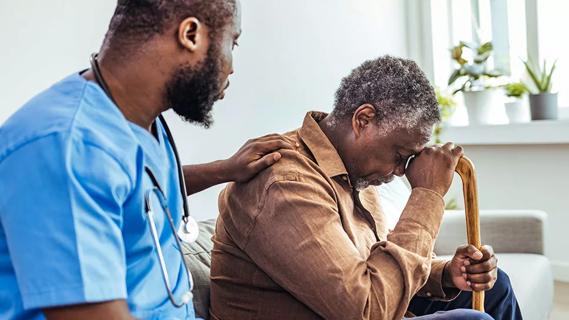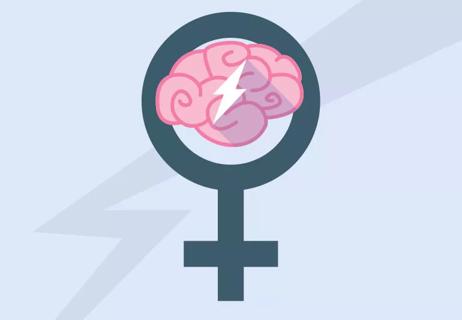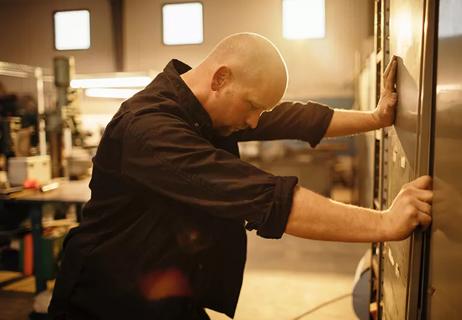Watch for depression, behavior changes

Not only can a stroke cause physical challenges, but it can also cause mental health struggles. Understanding the emotional as well as the physical effects of a stroke can prepare you and help you recover faster.
Advertisement
Cleveland Clinic is a non-profit academic medical center. Advertising on our site helps support our mission. We do not endorse non-Cleveland Clinic products or services. Policy
“There are a whole host of ways that stroke and recovery from stroke can influence personality and mood,” says neuropsychologist Darlene Floden, PhD. “The most common one is depression.”
Approximately 1 in 3 people experience depression during their recovery. About 20 percent will develop major depressive disorder, which means the symptoms are bad enough to impact a person’s day-to-day functioning.
Common symptoms include feelings of sadness and worthlessness, disruptions in sleep and appetite, and lack of energy.
“Depression is sometimes hard to recognize because the stroke itself may cause some of the same symptoms,” Dr. Floden says.
Those struggling to cope with new physical limitations from stroke may withdraw from others. This reaction also may stem from depression.
Although depression is the most common mental health concern for stroke survivors, you may see other changes in mood and behavior as well. These may include:
Stroke can also cause cognitive changes that may make it difficult to interact with others. Those recovering from a stroke may not recognize emotional expressions or sarcasm from others.
Advertisement
“The family thinks this person has become completely heartless because they don’t recognize when someone else is sad,” says Dr. Floden. “But that’s just one of the symptoms of the stroke.”
She encourages patience and says there is reason for optimism.
“A lot of these changes resolve in the first weeks or months after a stroke,” she says. “Depression gets better for a lot of people over the first year. A lot of the more dramatic changes are often fairly short-lived.”
That said, recovery isn’t always a straight line.
“There are people who develop depression as their recovery goes on,” Dr. Floden says. And some problems are more persistent, particularly when they relate directly to the area of the brain the stroke damaged.
Dr. Floden offers several tips for coping with the mental and emotional aftermath of a stroke:
1. Recognize the symptoms and seek help.
“If people have never had problems with their mental health in the past, they may not be open to seeing a therapist,” Dr Floden says. “But it’s important to recognize that a stroke can cause a change in mood just as it can cause a change in the function of a hand.”
Often, a therapist can help people work through challenging emotions.
2. Address mood changes because they can have a ripple effect on recovery.
Those who are struggling with depression may not fully engage in their rehabilitation. Or, they sometimes get discouraged with the process. This can lead to poorer outcomes. It’s important to see how the healthy emotions also foster a better recovery overall.
3. Seek social support.
It’s easy for stroke survivors to become isolated, especially if they’re struggling with new physical limitations. But engaging with others can make a big difference in recovery.
“Someone’s who’s isolated doesn’t recover as well,” Dr. Floden says.
4. Learn more about what’s ahead.
It’s important for caregivers and loved ones to learn about mood and behavior disruption. They need to know what to expect and understand that the survivor isn’t just being mean or stubborn.
5. Caregivers: Take care of yourself.
Caring for a loved one who’s had a stroke is often draining. It’s important to take time to recharge and seek your own support as necessary.
Although the mood and behavior changes that often come with stroke are challenging and distressing, addressing these problems can help make recovery faster and easier.
Advertisement
Learn more about our editorial process.
Advertisement

Seek immediate medical attention for sudden loss of balance, vision changes, slurring, facial droopiness and limb weakness

Strokes in the left side of the brain are more common and the effects are typically more noticeable

Your age, the type of stroke you had, the cause and the location can all impact your recovery

It can be overwhelming, but habit changes help lower your risk of another stroke

Hormonal changes and pregnancy are some factors unique to women

What you eat may protect you from a ‘brain attack’

Know the warning signs + decrease your risk

The short answer from a vascular neurologist

Wearing a scarf, adjusting your outdoor activities and following your asthma treatment plan can help limit breathing problems

Your diet in the weeks, days and hours ahead of your race can power you to the finish line

When someone guilt trips you, they’re using emotionally manipulative behavior to try to get you to act a certain way